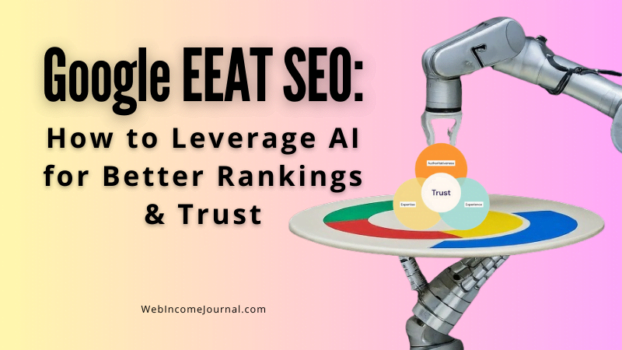Ever wondered how you can elevate your content’s quality and credibility in the context of Google’s EEAT?
As an SEO content strategist for over 10 years, I understand the importance of Google’s EEAT (Expertise, Authoritativeness, Trustworthiness, and Experience) for SEO, especially when it comes to YMYL (Your Money or Your Life) topics.
I also understand that it takes much effort and time to achieve credibility and trust online. However, the good news is that AI has the potential to significantly enhance your content’s E-E-A-T and SEO performance.
But how exactly does it work? And what benefits can it bring to your content strategy?
In this blog post, my aim is to guide you through the ins and outs of Google EEAT for SEO and the rising trend of AI-powered content creation. We’ll delve into each component of Google EEAT, explore how AI can help enhance these elements, and discuss practical strategies for leveraging AI for higher rankings and user trust.
By the end of this post, you’ll gain a deeper understanding of Google EEAT SEO and learn how to harness the power of AI to create high-quality, trustworthy content that resonates with your audience and Google’s algorithms.
So, let’s dive in!
Table of Contents
Recommended: SEO Course by Rank Math: Unleash Your SEO Expertise in 2024 and Beyond!
What is Google EEAT in SEO?
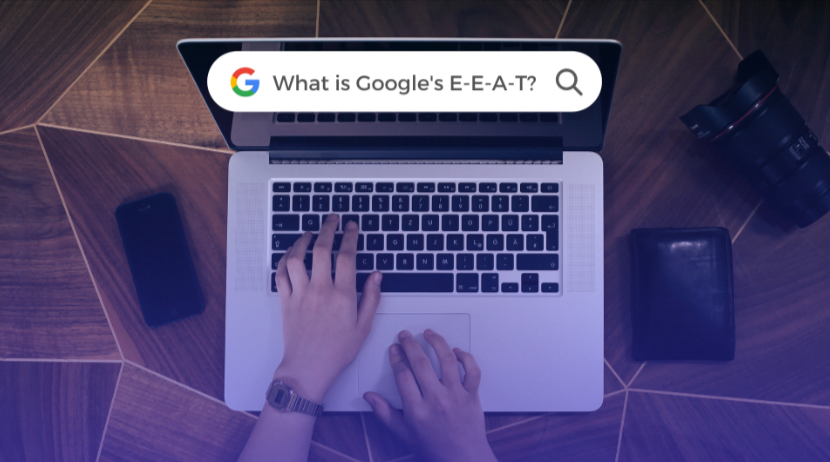
If you have been in the SEO world for some time now, you'll remember the days of keyword stuffing when black-hat tactics ruled the day. Thankfully, those days are long gone. Now, Google prioritizes content that can demonstrate a solid level of experience, expertise, authority, and trust.
That's where the acronym EEAT comes in: Experience, Expertise, Authoritativeness, and Trustworthiness.
Now, when it comes to SEO, Google’s EEAT is not just a ranking factor; it's a philosophy: creating content that deserves to be at the top of search results. To achieve this, Google uses these factors to evaluate the quality of your website and its content. This evaluation is guided by Google’s Search Quality Raters Guidelines (SQRG), a document used by human evaluators to assess the quality of Google’s search results.
When Google introduced this philosophy in 2014, it was just E-A-T. However, with the growing popularity of AI content writing tools, Google added another “E” to the mix in late 2022.
But what exactly does each component mean, and why are they so significant in the context of SEO?
The Components of Google EEAT
1. Experience
The first “E” Experience, emphasizes the value of firsthand knowledge on the topic you're writing about. As I have mentioned above, this was added by Google in late 2022. With this addition, Google now places more value on pages where the author has actually experienced the topic they are writing about.
For instance, if you're reviewing a new restaurant, having actually dined there would hold more weight than relying solely on online reviews. It is therefore important that you demonstrate firsthand experience in your content in order to boost your Google EEAT.
2. Expertise
The second “E” refers to the depth of knowledge or skill in a particular field. In the context of SEO, it means creating content that demonstrates a high level of expertise in your niche. For instance, if you're asking a financial advisor for investment tips, would you trust someone with a weekend seminar certificate or a seasoned professional with years of experience and relevant qualifications?
Of course, the answer is obvious: you’ll go for the seasoned professional. Expertise signals to Google that you know your stuff, making your content a valuable resource for users. So, a health blog written by a certified nutritionist would be considered by Google as expert content and therefore ranked higher.
3. Authoritativeness
The “A” stands for authoritativeness. But this isn't just about bragging rights (although awards and recognition are great!). This is about the credibility and recognition of the author or the website.
Google EEAT’s authority is determined by factors like backlinks from other high-authority websites, positive online reviews, and mentions in reputable publications. For example, a tech article written on a well-known site like TechCrunch would carry more authority than if it is written on a recipe-focused blog.
4. Trustworthiness
The “T” stands for reliability and honesty of the content and the website. All in all, trustworthiness boils down to this: does your content inspire confidence? Is it factually accurate, unbiased, and transparent? Does it cite credible sources and avoid misleading information?
For example, a financial advice website that clearly states its sources and disclaimers would be seen as trustworthy. Building trust takes effort, but it's the foundation of sustainable SEO success.
Presently, Google puts more emphasis on demonstrating E-E-A-T in niches that deal with YMYL (Your Money or Your Life) topics, e.g., finance, medicine, and health. This is because of their potential impact on the user’s life or finances. However, there’s no harm in demonstrating your experience, expertise, authoritativeness, and trustworthiness in every piece of content you create, as doing so will improve your SEO and gain user trust.
Recommended: How to Optimize Content for SEO Using Rank Math (In 7 Easy Steps)
The AI Advantage for Google E-E-A-T

Now that we know what Google EEAT is, let’s turn our attention to the latest phenomenon in content creation: AI-generated content. The last couple of years have witnessed an astronomical rise in AI-generated content, thanks to ChatGPT. As more and more people turned to AI to meet up with the demand for content creation, questions also arose based on Google’s template for search quality, E-E-A-T (Experience, Expertise, Authoritativeness, and Trustworthiness).
Some of these questions include: Can AI-generated content meet the requirements of Google EEAT? Can you leverage AI capabilities in any way to meet Google's E-E-A-T criteria?
The answer to these questions, considering Google's recent stance on AI and helpful content, is yes!
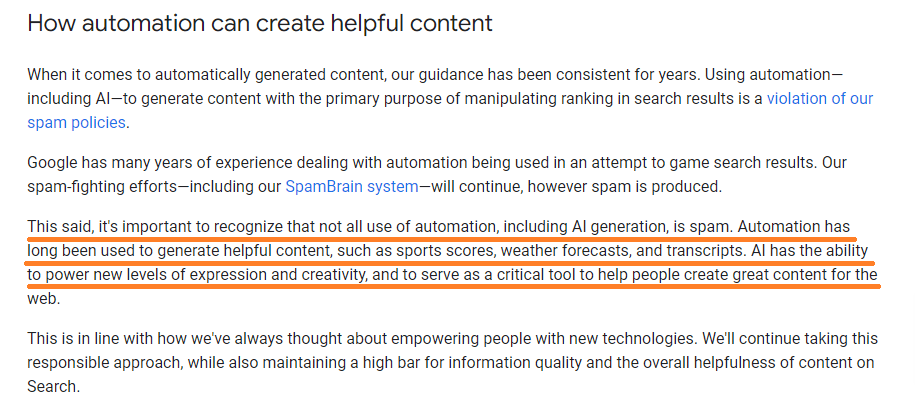
However, before we delve into how AI can help content writers achieve Google E-E-A-T, let’s first debunk some misconceptions bordering on AI and Google E-E-A-T.
AI and Google E-E-A-T Misconceptions
Misconception 1: AI-Generated Content is not E-E-A-T Friendly
Contrary to this belief, AI tools can help incorporate E-E-A-T best practices into your content. They can generate content that is not only engaging for readers but also optimized for Google E-E-A-T. For example:
- AI can help identify trending topics or key insights in a specific field, which can be used to create expert content.
- AI can help establish authoritativeness by analyzing data to identify authoritative sources and references, thereby enhancing its authoritativeness.
- AI tools can cross-reference information with credible sources, use fact-checking tools, and ensure that the content is free from errors, thereby enhancing the trustworthiness of the content.
- The updated E-E-A-T guidelines emphasize the importance of first-hand experience, and AI can also help with this by analyzing user reviews, comments, and other forms of user-generated content to gather first-hand experiences related to the topic.
Misconception 2: AI-Generated Content Lacks Originality
Again, this is not totally true. The reality is that AI tools can generate unique content based on the inputs and parameters you set. They can analyze vast amounts of data to uncover unique insights and generate content that is both original and factually accurate.
Misconception 3: AI Content is No Good
Just like point #2 above, this misconception stems from the belief that AI-generated content is inherently of low quality. The truth, however, is that the quality of AI-generated content varies greatly and can be significantly improved with the right setup and guidance. Depending on the AI tools you use and the inputs you give the tool, you can actually enhance the quality of the content that you generate.
Misconception 3: AI-Generated Content is Not SEO-Friendly
This is also not true. AI tools are designed to understand and incorporate SEO best practices, including keyword density, prominence, and readability. They can generate content that is not only engaging for readers but also optimized for search engines.
From the above, it is clear that while AI-generated content has its limitations, it can be a powerful tool for content creators when used correctly. It can help content creators meet Google’s E-E-A-T guidelines and generate original, engaging content for SEO. However, human input remains crucial for ensuring quality, context, and emotional connection.
That being said, let’s now see how AI can help you meet Google’s E-E-A-T standards.
AI’s Role in Meeting Google’s E-E-A-T Guidelines
Here’s how AI can help you, not only to create content that is optimized for search engines but also meets Google's E-E-A-T criteria:
- Accessing and Processing Vast Amounts of Data: In the digital age, we’re inundated with information. For content creators, sifting through this vast ocean of data to find relevant and valuable insights can be a daunting task. AI tools can analyze thousands of articles, blog posts, and social media updates in the time it would take a human to read a single article. This allows content creators to stay on top of the latest trends and developments in their field, enhancing their expertise.
- Identifying Relevant Trends and Insights: AI doesn’t just process data; it can also identify patterns and trends that might be missed by the human eye. For instance, AI can analyze search engine data to identify trending keywords or topics in your niche. It can also analyze social media data to understand what kind of content resonates with your audience. These insights can guide your content creation process, ensuring that your content is not only expert but also relevant and timely.
- Checking for Factual Accuracy and Avoiding Misinformation: In the era of “fake news,” factual accuracy is more important than ever. Misinformation can damage your reputation and undermine your trustworthiness. AI can help avoid this pitfall by checking the factual accuracy of your content. For example, AI can cross-reference your content with reliable sources to ensure that your facts are correct. It can also flag potential misinformation, allowing you to correct it before publishing.
Let’s now dive into each component and see how AI can help us demonstrate each of them in our content.
Recommended: SEO Copywriting Checklist: 6 Proven Strategies for Crafting Content that Ranks and Drives Traffic
How to Demonstrate E-E-A-T in AI-Generated Content
E: Demonstrating Experience

As we have seen, Google considers “experience” as a measure of how well a website or writer understands the subject matter of the content. It’s not just about having knowledge; it’s about being able to apply that knowledge in a way that adds value to the reader.
So, how do you demonstrate experience in E-E-A-T?
One of the ways to demonstrate experience is through case studies. Case studies provide real-world examples of how your knowledge or skills have been applied successfully. They offer tangible proof of your experience and can significantly boost your E-E-A-T score.
Client testimonials are another effective way to showcase experience. Positive feedback from clients or customers serves as social proof of your expertise and can enhance your credibility in the eyes of Google and your audience.
Citing personal experiences can also help. Sharing your own experiences related to the topic can make your content more relatable and engaging, further demonstrating your experience.
But how does AI come into play?
Here’s how AI can help you demonstrate experience in your content:
1. Highlighting Relevant Credentials and Experience
When it comes to establishing expertise and authoritativeness, your credentials and experience matter a lot. AI can help highlight these aspects in your content. For instance, AI writing tools like Copy.ai can analyze your bio, identify key points of your credentials and experience, and suggest ways to incorporate them into your content. This can help you create content that not only provides valuable information but also showcases your expertise and authority in the field.
2. Communicating Authorship to Search Engines
Authorship is a key factor in Google’s E-E-A-T. It’s not just about who wrote the content; it's also about how this information is communicated to search engines. AI can help with this. For example, AI can generate structured data markup for your content, which helps communicate the authorship information to search engines. This can enhance your content’s visibility in search engine results and boost its authoritativeness.
3. Writing Detailed, Authoritative Bios
A well-written, authoritative bio can significantly enhance your content’s E-E-A-T. It serves as a testament to your expertise and authority in your field. AI can assist in writing detailed, authoritative bios. It can analyze your credentials, experience, achievements, and more and craft a bio that effectively communicates your expertise and authority. Moreover, AI can ensure that your bio is optimized for SEO, incorporating relevant keywords and entities naturally.
Recommended: How to Measure SEO Performance Like a Pro (Even if You’re Just a Beginner)
E: Demonstrating Expertise
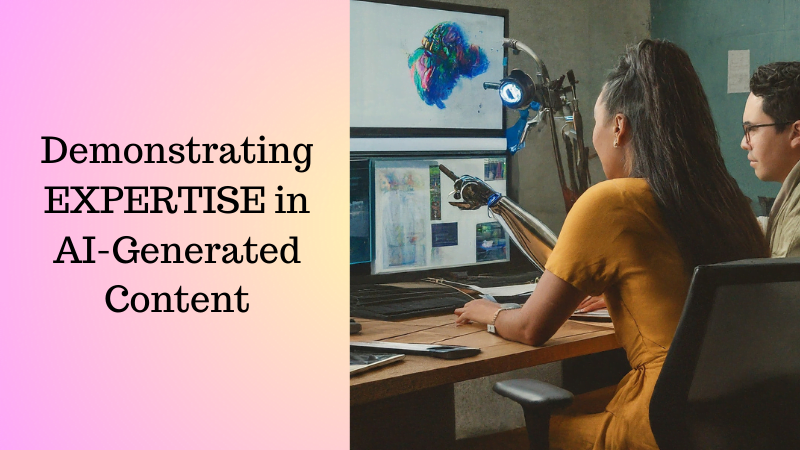
Expertise, the second component of Google’s E-E-A-T principle, can mean different things in different content areas. For a medical website, expertise might mean having content written by certified healthcare professionals. For a tech blog, it could mean having in-depth knowledge about the latest technologies and trends.
Essentially, expertise is about having a deep understanding of your subject matter and being able to communicate that knowledge effectively to your audience.
Some of the ways to showcase expertise in your content include effectively citing relevant qualifications, referencing authoritative sources, and using data-driven insights. For example, if you’re a certified professional in your field, you can mention this in your content. You can also cite research studies, industry reports, or thought leaders in your field to demonstrate a thorough understanding of your topic and a commitment to accuracy.
You can also incorporate relevant statistics and data into your content to boost your expertise. This is where AI comes into play. While AI cannot directly grant expertise, it can be a powerful tool for demonstrating expertise in your content. Here’s how:
1. Research and Data Analysis
AI can efficiently scan vast amounts of data from various sources to identify trends, insights, and relevant sources. This process, which could take humans hours if not days, can be completed in a matter of minutes by AI. This not only saves creators time and effort in research but also provides them with a comprehensive understanding of the topic at hand, thereby enhancing their expertise.
2. Content Ideation and Outlining
AI can suggest content ideas based on keyword research, user intent, and current trends. It can analyze search queries to understand what users are looking for and suggest content that aligns with this search intent. Furthermore, it can identify potential areas of expertise that creators can focus on. This ensures that the content created is relevant, timely, and caters to the needs of the audience.
3. Content Creation Assistance
AI can help draft content outlines, generate initial text, and suggest relevant statistics and examples. This allows creators to focus on refining the content with their unique expertise and voice. AI can provide a solid foundation for the content, upon which creators can build and add their personal touch. This collaboration between AI and human creativity can result in high-quality content that demonstrates expertise.
4. Fact-Checking and Accuracy
Ensuring content accuracy is a crucial aspect of expertise. Misinformation can harm a creator’s reputation and affect their ranking on search engines. AI can cross-reference information from multiple sources to ensure its accuracy, thereby enhancing the trustworthiness of the content.
5. Personalization and Tailoring
AI can personalize content for specific audiences based on demographics and interests. It can analyze user behavior and preferences to tailor content that resonates with them. This demonstrates a deeper understanding of user needs and expertise in the niche. Personalized content is more likely to engage users, increase dwell time, and improve SEO rankings.
A: Demonstrating Authority
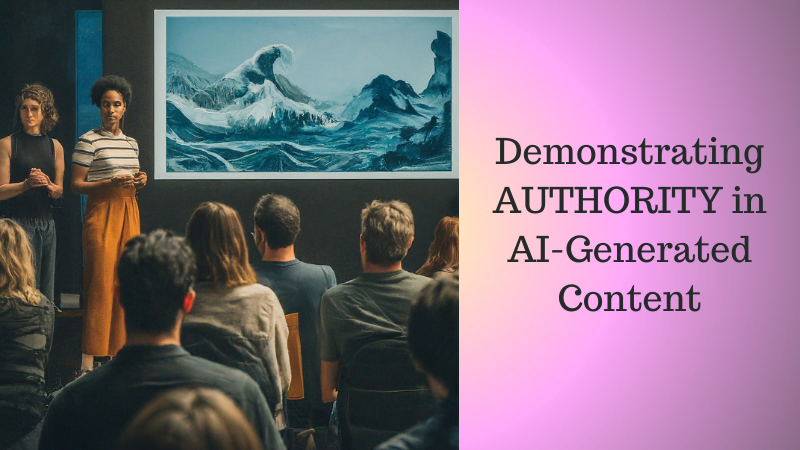
Authoritativeness is another key component of Google’s E-E-A-T. It’s about establishing your website or content as a go-to resource in your field. Google uses various signals to identify authoritative websites and content. These include the quality and quantity of backlinks your site receives, the reputation of your site on the web, and the credentials of the content creators.
For instance, a website that consistently publishes high-quality content and receives backlinks from reputable sources is likely to be seen as authoritative by Google.
When it comes to building authority, there are several techniques you can employ. One effective way is by earning backlinks from reputable sources. When a reputable site links to your content, it’s like a vote of confidence in your content’s quality and relevance.
Guest blogging on authoritative sites is another great way to build authority. By contributing high-quality content to reputable sites in your field, you can establish yourself as an expert and gain visibility for your site.
Yet another way is by citing research publications in your content. This can greatly boost your authority. When you reference authoritative sources in your content, you show that your content is well-researched and reliable.
So, how does AI help you demonstrate authority in your content?
1. Suggesting Authoritative Sources and References
AI can assist in building authority by suggesting relevant and credible sources based on your content. For instance, AI tools like SEMrush can analyze your content, identify key points that could benefit from supporting references, and suggest authoritative sources from its vast database. This not only enhances the authoritativeness of your content but also provides additional value to your readers.
2. Checking for Plagiarism and Ensuring Content Originality
Plagiarized content can harm your SEO performance and damage your reputation. AI can help avoid this by checking your content for plagiarism. Tools like Copy.ai can compare your content with millions of other documents on the web and flag any potential plagiarism. This ensures that your content is original and unique, enhancing its authoritativeness.
3. Building Internal Linking Structures for Website Authority
Internal linking is a powerful SEO strategy that can enhance the authority of your website. By linking your content to other relevant pages on your site, you can guide your readers to more of your content and keep them engaged longer. AI can assist in this by identifying opportunities for internal linking based on the content of your pages. For example, AI can suggest linking a blog post about “Google EEAT SEO” to a related post about “SEO best practices.” This not only enhances the user experience but also boosts the authority of your website.
4. Identifying Opportunities for Backlinks
AI tools like SEMrush can provide insights into your backlink profile, helping you identify opportunities to earn backlinks from reputable sources. It can pinpoint reputable sources that are relevant to your content and could potentially link back to your site. This proactive approach can help you expand your backlink profile strategically.
5. Automating Citation Generation
AI can also help with citation generation. Accurate citations allow you to demonstrate your content's authority. By automatically generating accurate citations for the sources you reference in your content, you show that your content is backed by experts or authoritative entities in the field. This can significantly boost your content's standing in terms of Google's E-E-A-T guidelines.
T: Demonstrating Trust
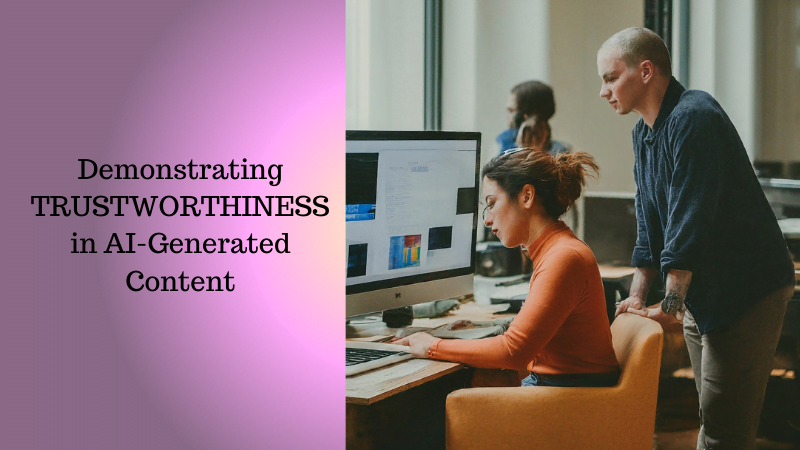
Trustworthiness is the final component of Google’s E-E-A-T, and it’s all about reliability and transparency. Several factors establish trust with Google and users. These include transparency (being open about who you are and what your content aims to achieve), factual accuracy (ensuring that your content is accurate and up-to-date), unbiased information (providing balanced and fair viewpoints), and clear content ownership (making it clear who is responsible for the content).
When it comes to demonstrating trustworthiness in your content, there are several strategies you can employ.
- Citing sources: By referencing reputable sources, you show that your content is well-researched and reliable.
- Disclosing affiliations: If you have any affiliations that could influence your content, disclosing them can enhance your transparency and trustworthiness.
- Fact-checking – This is crucial for ensuring the factual accuracy of your content. By checking your facts before publishing, you can avoid spreading misinformation and enhance your credibility.
- Using clear and concise language: This can also enhance trustworthiness. By making your content easy to understand, you show respect for your readers’ time and cognitive load, which can enhance their trust in you.
So, how can AI help enhance trustworthiness?
1. Optimizing Content for Readability and Clarity
Readability and clarity are key factors in building trust with your audience. If your content is difficult to read or understand, it can undermine your credibility and turn readers away. AI can help optimize your content for readability and clarity. For instance, AI-powered writing tools like Rank Math’s ContentAI can analyze your content and suggest improvements to enhance readability. Tools like Grammarly are also good in this respect. It can analyze your content and make suggestions on simplifying complex sentences, correcting grammar errors, and ensuring a clear and logical flow of ideas.
2. Personalizing Content Based on User Intent and Needs
Personalization is another powerful way to build trust with your audience. By tailoring your content to the specific needs and interests of your readers, you can make them feel valued and understood. AI can assist in this by analyzing user behavior data and identifying patterns that indicate user intent and needs. For instance, if AI identifies that a significant portion of your audience is interested in beginner-level SEO tips, it can suggest creating more beginner-friendly content.
3. Ensuring Consistent Brand Voice and Message
Consistency in the brand's voice and message is crucial for building trust. If your content varies widely in tone or strays from your core message, it can confuse your audience and undermine your credibility. AI can help ensure consistency in your brand's voice and message. For instance, AI can analyze your existing content to understand your brand voice and then suggest edits to new content to align it with that voice.
4. Sentiment Analysis
Artificial intelligence (AI) is great for sentiment analysis, which is crucial for the trustworthiness of your content. By analyzing the sentiment of your content, AI can help you ensure that your content is balanced and fair. This balance enhances the credibility of the content, making it more trustworthy for readers. Furthermore, this balance leads to increased reader engagement, a positive signal for Google’s E-E-A-T guidelines.
Recommended: Liquid Web Reviews (+ The Best Alternatives for 2023)
Frequently Asked Questions on Google EEAT SEO
What is Google's E-E-A-T algorithm?
While Google doesn't have a specific “E-E-A-T algorithm,” it's a core concept within their Search Quality Rater Guidelines. These guidelines help human evaluators assess the trustworthiness and expertise of websites and content. E-E-A-T stands for Experience, Expertise, Authoritativeness, and Trustworthiness. Google prioritizes content that demonstrates these qualities, especially for topics that impact users' “Your Money or Your Life” (YMYL) well-being.
Is AI-generated text bad for SEO?
Not necessarily! AI can be a powerful tool for generating content ideas, outlining structures, and even drafting initial text. However, relying solely on AI-generated content without human editing and expertise can hurt your SEO. Google prioritizes original, informative content written by humans with genuine understanding and experience.
Can I use AI-generated content on my website?
Yes, but use it responsibly. Disclosing the use of AI is recommended for transparency, and always prioritize human review and editing for accuracy and quality. Remember, Google values authentic, trustworthy content created by humans with genuine expertise.
What is the “Experience” in Google's E-E-A-T?
The “Experience” aspect goes beyond just qualifications. It emphasizes firsthand knowledge and practical understanding of the topic at hand. Google rewards content created by individuals who have genuinely used, tested, or lived through what they're writing about. This adds depth and credibility to their writing, making it more valuable to users.
How do you show Experience in E-E-A-T?
Highlight the author's relevant background, credentials, and achievements. Share personal anecdotes or case studies that demonstrate their firsthand knowledge. Include details about their experience with the topic, showcasing their practical understanding.
Conclusion
There you have it, my guide on using AI to demonstrate Google EEAT. As we have seen in this post, AI-powered tools offer several key benefits for Google EEAT content creation.
Key Takeaways:
- AI can access and process vast amounts of data, identify relevant trends and insights, and check for factual accuracy, thereby enhancing your content’s expertise.
- AI can suggest authoritative sources, check for plagiarism, and build internal linking structures, thereby boosting your content’s authoritativeness.
- AI can optimize content for readability and clarity, personalize content based on user intent, and ensure a consistent brand voice, thereby building trust with your audience.
The above notwithstanding, it’s important to note that AI is not a magic tool. Yes, it is powerful when it comes to content generation but it has a lot of limitations. For example, the risk of AI-generated content lacking a creative voice, potential bias in AI algorithms, and the possibility of factual errors.
As we navigate this exciting landscape therefore, it’s crucial to continue learning, experimenting, and sharing our experiences. The future of AI in E-E-A-T content creation is promising, with new trends, opportunities, and advancements on the horizon.
Feel free to share your experiences on this topic with us in the comments below. Let’s continue the conversation and learn from each other as we explore the intersection of AI, Google EEAT and SEO. Together, we can navigate the challenges, seize the opportunities, and shape the future of SEO.
Related: Top 10 SEO Predictions for 2024 (And How You Can Prepare for Them)

